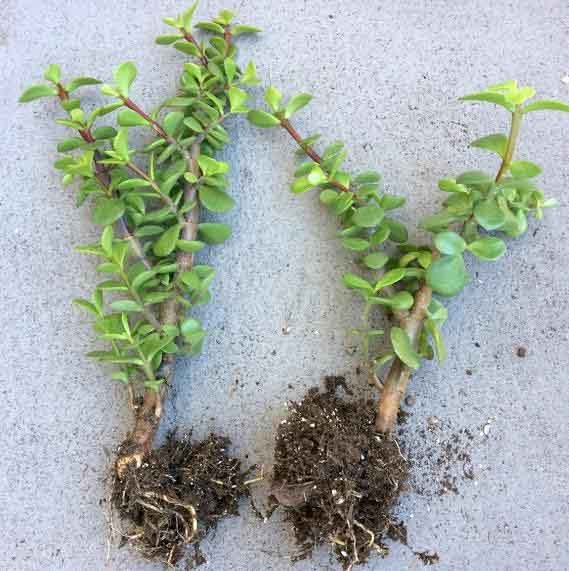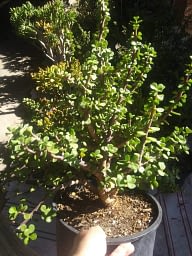Portulacaria Afra: Elephant Bush care. Elephants love to eat this plant. The plant is a succulent with glossy leaves that begin to grow as a small bush. Elephant bush houseplants or Portulacaria Afra thrive in bright light in a warm, and draft-free room.

Portulacaria Afra or Elephant Bush is originated from southern Africa. They are used mainly as food for elephants or elephant food. But other wildlife can eat the plant in their native habitat.
The plant can grow to 20 feet tall. The stems are reddish-brown. The leaves are with glossy green leaves. The foliage is used as food in some cultures.
Alternate names of Portulacaria Afra
Other alternate and common name of Portulacaria Afra including Pork Bush, Elephant Bush, Dwarf Jade Plant, and Spekboom.
Portulacaria Afra profile
First, the elephant bush succulent begins as a very small bush and as time goes by the plant grows tree-like. When the tree is in its mature stage, the stem gets thicker. The elephant bush plants are easily grown and easy to propagate.
The Elephant Bush growing horizontally upright. You can also arrange the plant to spread out laterally. You can hang and sprawl in hanging baskets.
Portulacaria Afra or Elephant Bush is different than Crassula Ovata ‘Jade Plants’. The look might be similar in a lot of ways. Both plants are not related at all.
It is a mini Jade or miniature Jade plant or Dwarf Jade Plant but you have to know that they really are not related. It is not related to elephant plants.
Elephant bush only flowers when grown in mild climates, has very tiny pink flowers on the ends of the bush succulent stems.
Portulacaria Afra Variegata or Variegated Elephant Bush
There are a few types of Portulacaria Afras. The most common type is Portulacaria Afra Variegata or Variegated Elephant Bush or Rainbow Bush or the variegated forms of Elephant Bush. These have the same features as Portulacaria Afra. The difference is that the leaves have an attractive hue of variegated green and cream.
It also has reddish-brown stems and tends to grow laterally. Not growing upright like Portulacaria Afra. The care for these plants is similar.
How to grow and care for Portulacaria Afra or Elephant Bush
Soil for Elephant Bush care
Because Elephant Bush belongs to a succulent plant, Portulacaria Afra or Elephant Bush requires well-draining soil. Use a mixture of cactus potting mix with perlite for better drainage. To grow elephant bush you need drainage holes with the pot.
The ratio should be 2:1 blend of cactus mix and perlite. You can also use sandy soil that works well too. Mixing cactus mix or potting soil with coarse sand with a 2:1 ratio will do just fine.
Light
Portulacaria Afra requires much amount of bright sunlight. The plant can also tolerate full sun. You may need to adapt the plant to full sun gradually. Under extreme heatwave, mild sunburn may be expected. If not, the plant can handle the heat.
Indoor lighting
If you are growing elephant bush indoors as indoor succulents, you must find the brightest spot you can find. The best location is a south-facing window. An east or west-facing windows work well too.
Before relocating the plant, you must search the right spot and you may relocate the plant a few times. The ideal number of hours of light would be at least 5 to 6 hours.
If by any chance you really do not get the brightest spot, you may purchase growlights so the plants can receive their lighting needs to grow properly. This would be very helpful during the dark days of winter months.
Outdoor lighting
Portulacaria Afra or Elephant Bush thrive well in areas that receive much amount of sunlight. The plant actually can tolerate partial sun to full sun. They would be happy if receiving bright filtered sunlight.
If the plant is to be placed or plant outdoors, move the plant to the bright sunny spot. To avoid leaves sunburn, they must be adapted to the full sun. Slowly increase the amount of sunlight it gets until it is fully adapted to the full sun. Avoid extreme heatwave or intense heat so the leaves won’t get sunburned.
During heatwave or intense heat, you can use sunshades for the plants. It is when the temperatures may rise above 100℉ or 37.8℃.
Cold weather
Portulacaria Afra can tolerate mild frost in a short time only. Freezing temperatures may also be tolerated in a short period of time.
If you have extreme winter conditions, plant and grow the Elephant Bush plants in pots or containers. So when the weather is very cold and freezing, you can relocate indoor.
Watering for Elephant Bush care
The watering practice can be determined by the climate you live in. Because the elephant bush portulacaria afra plants are highly adapted to dry conditions and drought tolerant, they do well when being watered properly.
In a very dry climate, the watering schedule is acclimated to the dry conditions of the environment. In the summer months of June to September, practice watering the Elephant Bush once a week or 3 times in a month.
You can provide more watering during a heatwave or intense heat, giving the plant a nice drink. When the temperature is going down, the watering practice should be about 10 to 14 days.
In a humid location, the plant does not require much watering. If the plants are located indoors, the plant needs little watering. Especially if they are not receiving a lot of light.
During the winter season, you can rely on rainwater. Stop watering. If there is no rainfall, water the Elephant Bush plant at least once a month or every 3 weeks.
To know when to water the plant, you have to use a moisture meter to check the moisture of the soil. The top inch of the soil has to be dry before you can water again.
To practice better watering techniques and practices, use hygrometers or moisture meters to check for moisture in the soil and also the air. The tools are affordable and beneficial if you are unsure of when to water your plant next.
Fertilizer for Elephant Bush care
Feed the plant and use a balanced houseplant fertilizer or succulents and cactus fertilizer. Use half-strength diluted fertilizer recommended in the package.
When is the best time to fertilize Elephant Bush and how often?
Fertilizing once a month during the Elephant Bush’s active and growing season. That would be in the springtime (March to June) to early fall (September) should be enough.
How to propagate Portulacaria Afra
Portulacaria Afras is one of the simplest succulents to propagate from stem cuttings. Stem cuttings are the fastest and simplest method route to propagate. Stem cuttings not only easier, faster but it is almost foolproof.
Other methods would be rooting from leaves. Leave the fallen leaves when they fall in the pot.
Use the whole leaf including the base to ensure the success of propagation by leaf cuttings. Leaf propagation takes longer timer and harder to practice.
Propagate Portulacaria Afra by stem cuttings
Step 1
Get a small number of stem cuttings or leaf cuttings. Put them on a flat surface and allow them to dry for two days or more.
Step 2
Put down the cut end in a rooting hormone. Rooting hormone will speed up the process and may guarantee success.
Step 3
After drying the cut, they must have healed and dried. Stick the cuttings in about 3 inches into well-draining potting soil or potting mix. For leaf cuttings, stick them in the soil or lay them on the soil.
Step 4
Prevent the new cuttings from receiving direct sunlight. See if the soil gets dry, water the soil every 3 days.
Step 5
New roots will begin to grow in about 2 weeks after planting.
Step 6
Wait for another four to six weeks. By this time the new cuttings are fully rooted. New growth will develop from the top.
Step 7
You can see how easy it is to propagate Elephant Bush from stem cuttings. In just 6 steps and 6 weeks away, you will have a new plant of Elephant Bush. You can multiply for as many as you like.
Recommended accessories
Elephant Bush live plant

Hygrometer

Soil

Rooting hormone

Fertilizer

Frost protection

Sunshade

Growlights
